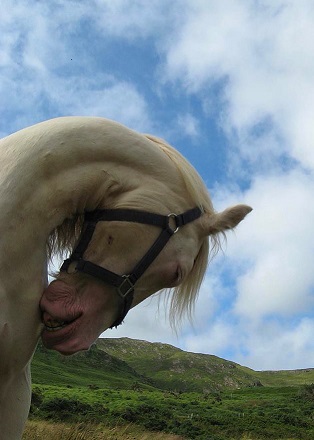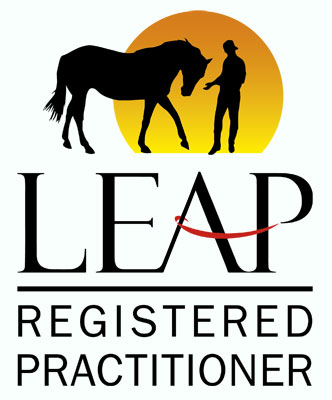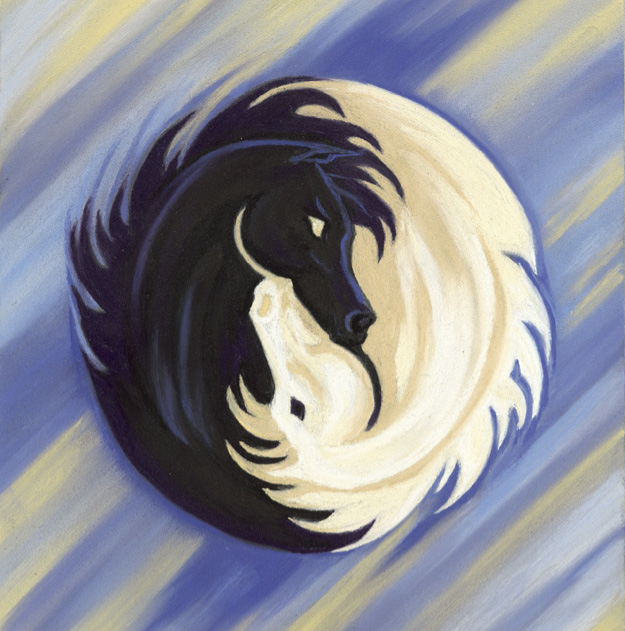
Blog
The Myth of the Moody Mare
21 August 2015
How we denigrate our female horses in the same way women and the feminine are belittled in our society.

I have been noticing more and more recently how many women horse owners and professionals regard their mares in very disturbing ways. Note I say women, as worryingly, this seems to be a very prevalent trait in women equestrians.
This is partly because so many horse owners and riders are women, but to me, it also illustrates the depth to which these beliefs are so entrenched in our society that women have whole-heartedly swallowed these damaging beliefs, and are now the ones unconsciously perpetuating them.
Many regard mares in general as “problematic”, and they are often labelled as “moody”, “temperamental”, and generally just more “difficult” than geldings.
This seems to me to be an insidious parallel projection onto our female horses of the ways in which women and the feminine in general is regarded and treated in our deeply patriarchal society.
Patriarchal means a societal structure that favours men, and where the systems enable men to hold power over women through its power structures and relationships. Typically power, money and resources are passed down through the male elders. But is also inevitably means that attitudes, which of course lead to behaviour, are biased against women.
Patriarchy is believed to have developed during the Iron Age where a shift took place within human development, and, whereas previously people had revered and taken power from nature; now people sought to exert power over nature. [Marion Woodman, Dancing in the Flames, p.21].
As a result of this massive shift in attitudes women began to be devalued in the same way that nature was, and priority began to shift towards men and male lineage which became vastly important.
Today we live with the consequences of thousands of years of deeply embedded patriarchal attitudes and practices which are in favour of men and masculine values such as logic, rational, goal-seeking, control, dominance and power being the most noticeable aspect of patriarchy. It is through seeking power over the natural world that man has sought to conquer, control and destroy any aspect of the natural world that does not suit their mission and illusion of control.
So how does this fit with how we treat our horses?
Well one of the ways in which patriarchy works is through the unquestioned denigration of the feminine, in both women and men. This happens through the language, labels and stereotypes that are perpetuated throughout our life from birth, until we become conscious enough to reconise that it feels wrong and start to change our own patterning.
With regard to horses, they embody many typically recognised feminine traits: they are closely connected to the land, earth and elements in which they live; they see emotions and feelings as normal, healthy, and indeed vital to their survival and well-being; they are exquisitely in tune with their intuition and gut instinct, and they value relationship, connection and harmony over tasks and goals.
Mares (female horses), therefore, embody ALL of these more feminine aspects fully, plus the added factor of still retaining their full range of active hormones and cycles (unlike geldings - castrated male horses).
Mares go through life innately in touch with their body, emotions and instincts, and because of this they are also very much affected by their hormonal fluctuations, cycles and how these affect them.
Therefore, to label mares as “moody”, or “temperamental” as a result of this natural way of being, is nothing short of a further perpetuation of debasing feminine, womanly attributes, and the unique female biology of the reproductive cycles.
To female readers with mares, ask yourself these questions:
• How do you feel when others label you as "moody"; "touchy"; "too emotional"; "a bitch"; "overly sensitive", and so on?
• How do you feel when during your own cycle, your feelings and moods fluctuate seemingly with a will of their own? How do you feel when your body is crying out for a rest and nourishment yet you continue to work and push yourself regardless of how you really feel?
• Does is not irk you when society continues to label women as: “Irrational”? “Moody”? “Hormonal”? “Too sensitive”?
• Does it not disempower you when you are dismissed at work, something you are really good at, because you are a woman, or because of your "female ways"? Does the consistent repeated debasing language used about women not take its toll and make you feel worn-out, unseen and undervalued?
• How would you feel if someone referred to you as: “A typical woman”? As many do with horses: “They are a typical mare”. I personally would hate to be referred to in this way, and never do this whether about other women or men. To hold hard and fast, concretised viewpoints about others is very harmful as it removes for the possibility of an in-the-moment, spontaneous connection that could potentially occur. It adds baggage to the other, who is then hindered by the labelling and probably inaccurate stereotype that is being pinned on them.
• Do you think stereotyping of anyone is healthy? If not, then why do you continue to do this with regard to your horses?
With regard to how we treat our horses, what I have witnessed is a hard and fast attitude that sees mares and geldings in completely different ways. This is so deeply entrenched I worry about the impact this has and is continuing to have on our mares and the relationships with their owners and handlers.
It seems to me that many mares are being deeply misunderstood by their very owners, and deeply disregarded, rather than being seen instead for the horse that they are.
I have looked-after and owned mares and geldings and I treated them all just as individual horses, without holding a fixed gender stereotype in my head about either, nor a preference for being with or handling either. Instead, I got to know each of them as individuals and responded to them as individual horses, with unique characters and spirit. They all lived together very happily too, I might add, the whole time they were together as a herd.
I find it ludicrous that mares and geldings are separated, another off-shoot of this patriarchal attitude.
What also seems to happen is that when mares and geldings are put out together, the stereotypes continue, with the mares being labelled as “flirtatious”, i.e. seemingly "coming onto the geldings"; yuk... Does that not sound very much like: “She was asking for it”…? In others words, it is yet again the dangerous, overly-sexualised and flirateous woman who is to blame for causing trouble. Hmm... You see my parallels here...
Now many people also seem to hold the view that geldings are much easier to handle and be around, they are “less hard work”, “less moody”, easier going, etc. Well think about why this difference may be. The gelding has had his connection to his hormonal source cut off. He has been castrated, he has no recourse to his more instinctual and fluctuating natural-self, unlike the mares. So no wonder there is a considerable difference in behavior. They have been depontentiated and have no recourse to their powerful potency that stallions retain; of course they are easier to handle.
And yet people prefer to ignore this crucial difference and instead add to the outdated and harmful view that it is because the mares, aka: women, are more of a handful. Do you see? The blame still gets passed to the females.
Let me give you a horse-based example of such attitudes to illustrate my point:
I worked with a young mare some time ago who was being completely misunderstood by all of her handlers. This mare was highly sensitive to her personal space and especially to being physically touched, so she was simply giving her involuntary physical cues that tried to tell her handlers this.
She would put her ears back when being approached, or when being touched. This is very simply a sign that she is not happy with this. Yet this was being interpreted as her being “moody”, “difficult” and “aggressive”. In fact, she was being none of these things, she was simply communicating her preferences for how close people got, and also, when and how people touched her.
A whole myth had been created and was being perpetuated around this particular mare, who to my eye, was living a solitary life as a result; always being kept at arms’ length. No real connection was attempted with her by any of the people because the size of their projection was just too darn big, and so got in the way of them being able to see this horse as she truly was.
Now, I had never met this horse before and I was not interested in her “back-story”. When I meet a horse, I prefer to notice how I feel around them and notice their approach and behavior towards me and anyone else around. To me there is vastly more information in that than a “story” that is being passed down from person to person and holding this horse in a fixed image and belief.
What transpired as I worked with this mare the following day was a fundamental misunderstanding of her ability to communicate with her handlers. Yet when I had an interaction with her and set a boundary with her we had a no-fuss, relaxed meeting. What did become apparent was that she needs some tuition from her handlers about others’ boundaries, as this had been missing and so she was confused by her confusing handlers’ approaches, which bordered on them being aggressive, as they would push her away angrily, calling her “moody and difficult”. She was utterly disregarded and that was what made me feel she was in fact lonely and isolated.
At this point, I will throw-in one of the most helpful phrases that I have come across with regard to understanding both horses (and indeed all animals), and people: “Misbehaviour is a form of communication”.
When you start to label a horse or person as “difficult”, stop, and ask instead: “What are they trying to communicate to me?” A horse that pins its ears back is telling you it is angry, or simply to back-off.
So why does all of this matter?
1. As stated earlier, and illustrated in my example, we are treating our mares badly. We are misunderstanding them and as a result we treat them differently, and unfairly.
2. When you denigrate others in this way, including horses, you denigrate yourself and all other women.
3. You continue not to see horses as horses but instead as an extension of your own attitudes and beliefs, and so no potential for an equal, untainted relationship exists.
4. Any labelling, stereotyping and fixed viewpoint is harmful to those on the receiving end, and ultimately to yourself also.
5. You don’t see the true nature and potential of the horse.
6. You contribute to the myths that feminine traits such as emotions and fluctuating hormones are “bad”, and problematic, and maybe that women are bad in general too.
7. You perpetuate the myths that feminine attributes and ways are undesirable, that they should be ridiculed, ignored and covered up, for example: hormonal fluctuations, bodily sensations, emotions, weight, diet, intuition and connection are all treated in these ways rather than valued and paid attention to.
So any attempts to be “authentic” are, in fact, in vain, as you regard your horse through an outdated lens that is weighed down in patriarchal harmful nonsense, and is steeped in power and dominance.
Instead, how about we women try to create and encourage new, positive and empowering language to describe our beloved female horses who do so much for us. Let’s instead use language like: sensitive, connected, loving, nurturing, gentle, mothering, playful, curious, healthy boundaries, spirited, lively, wild, free, has clear communication, instinctive, and powerful.
Let’s regard our mares as positively instinctual, supportive, interesting and valuable.
Next time you visit your mare, see if you can discard your beliefs and try out a fresh approach to her, and see how she responds, she may well surprise you and a new more loving relationship may have the chance to develop.
© Angela Dunning, 20 August, 2015








